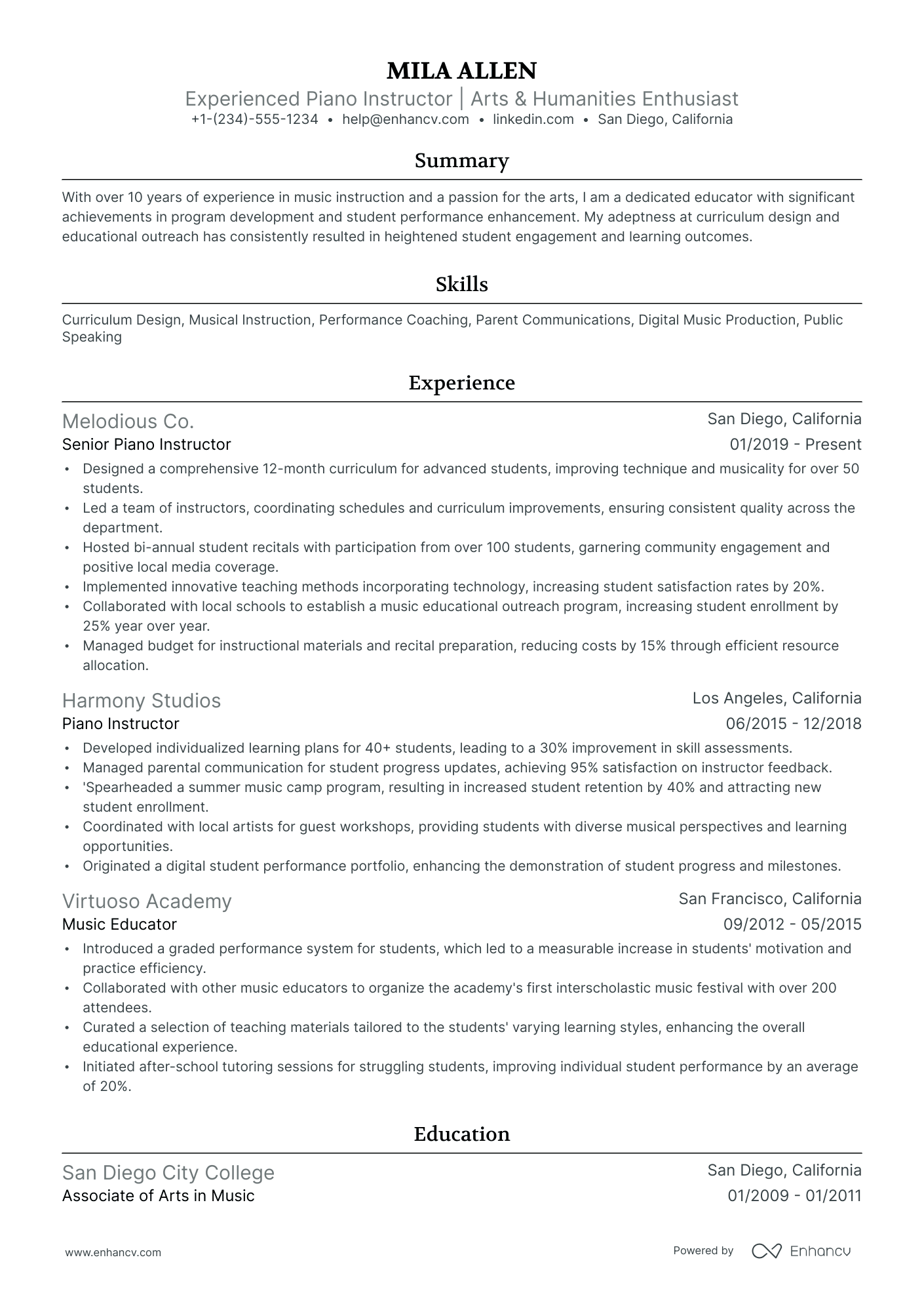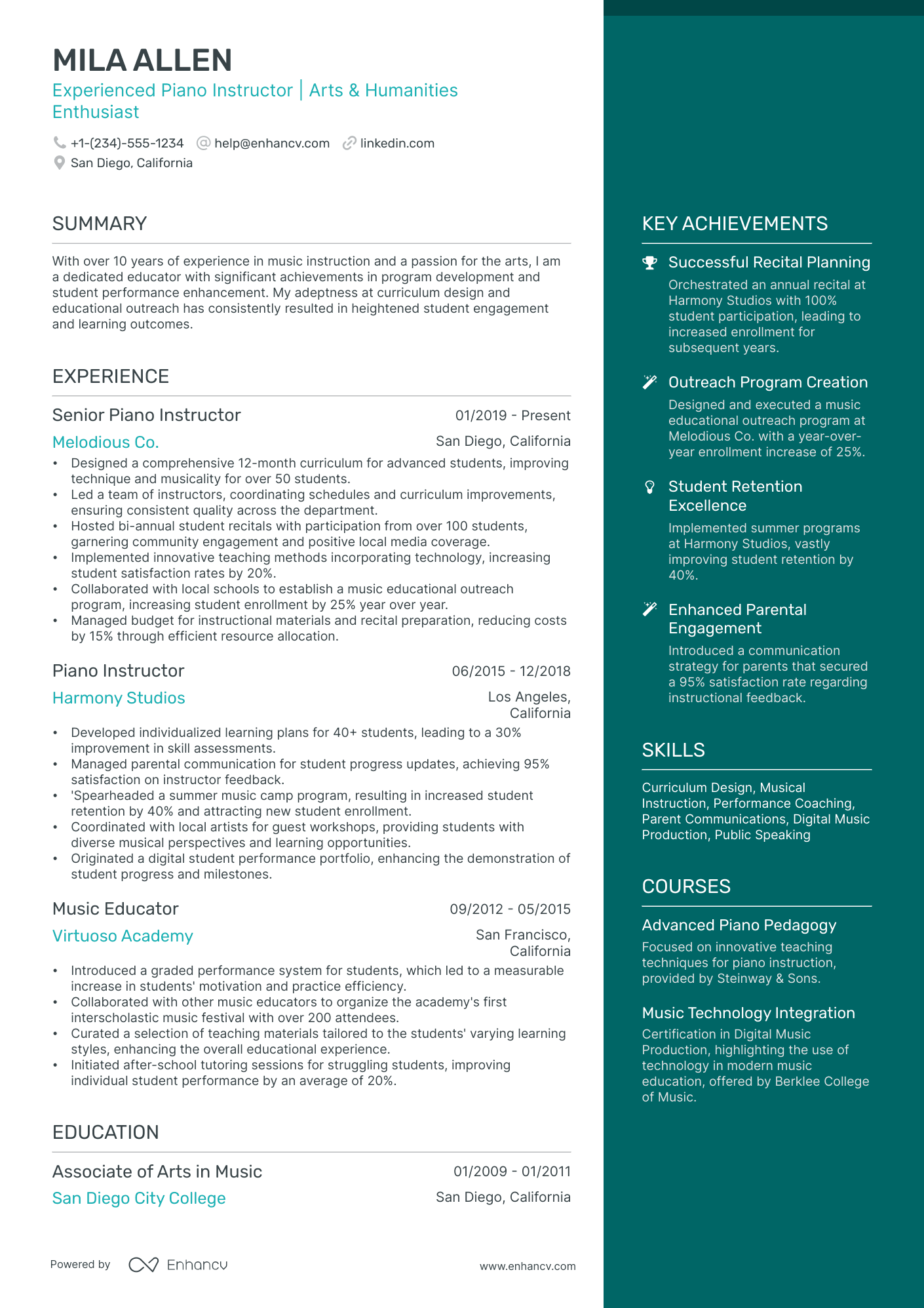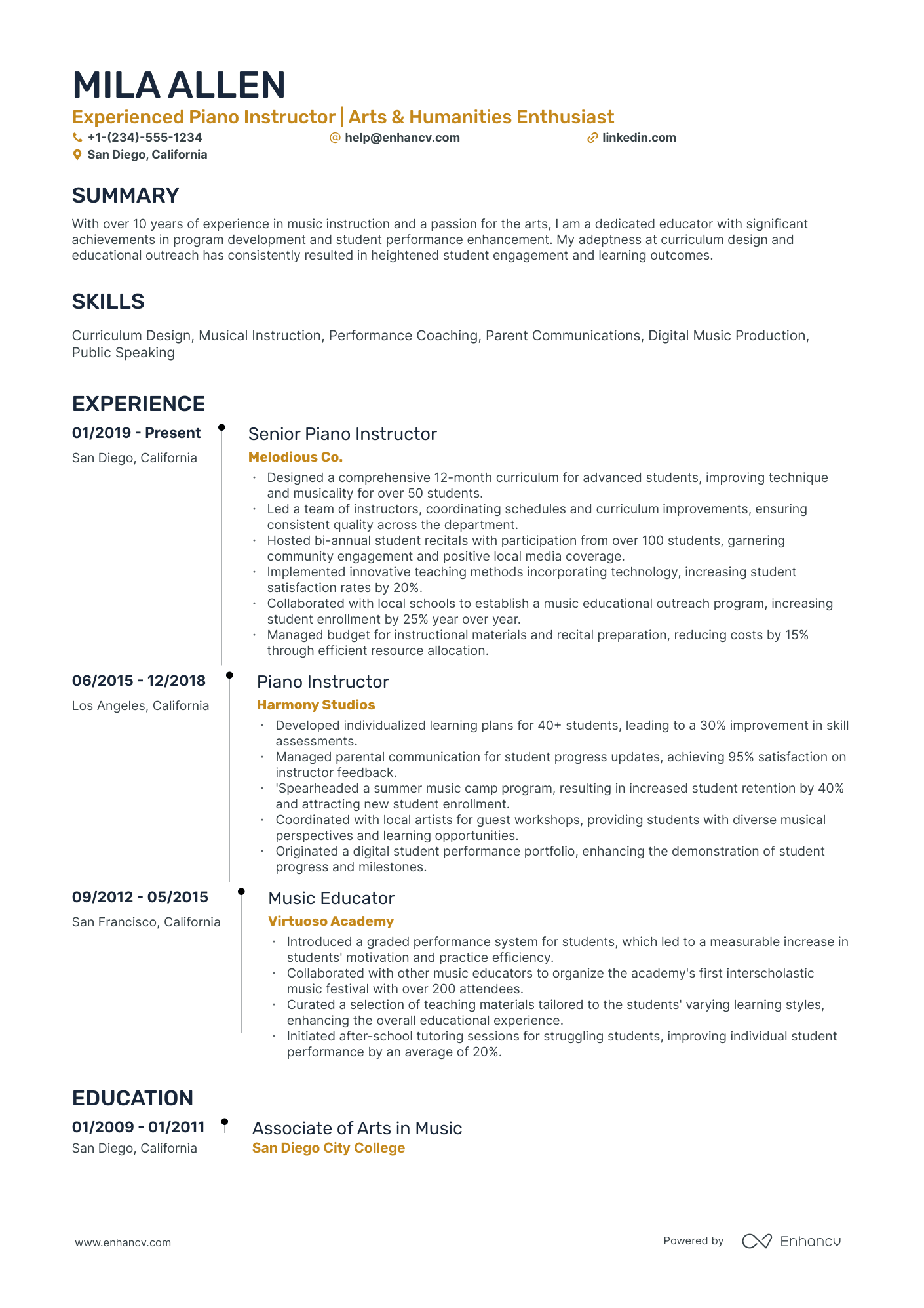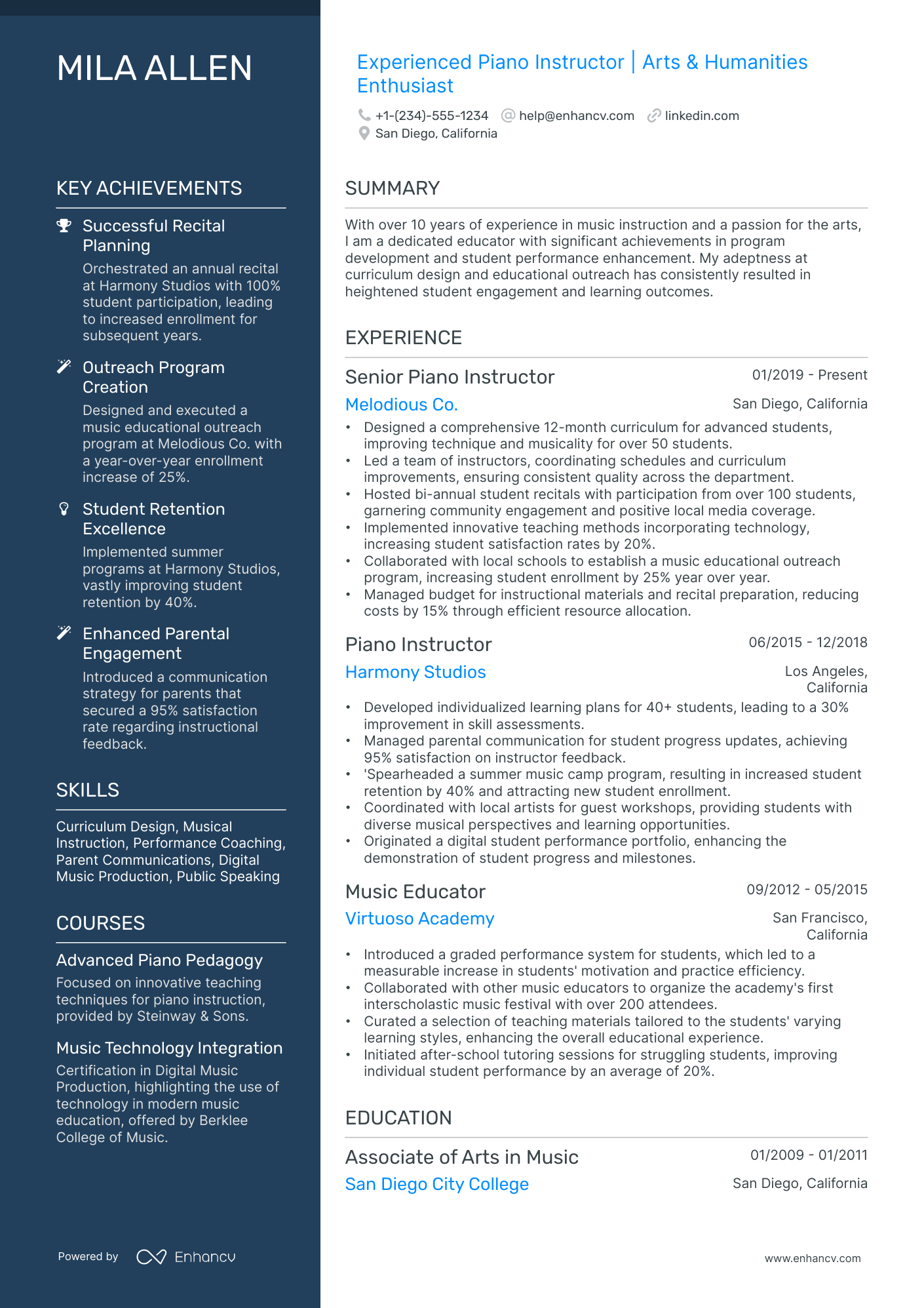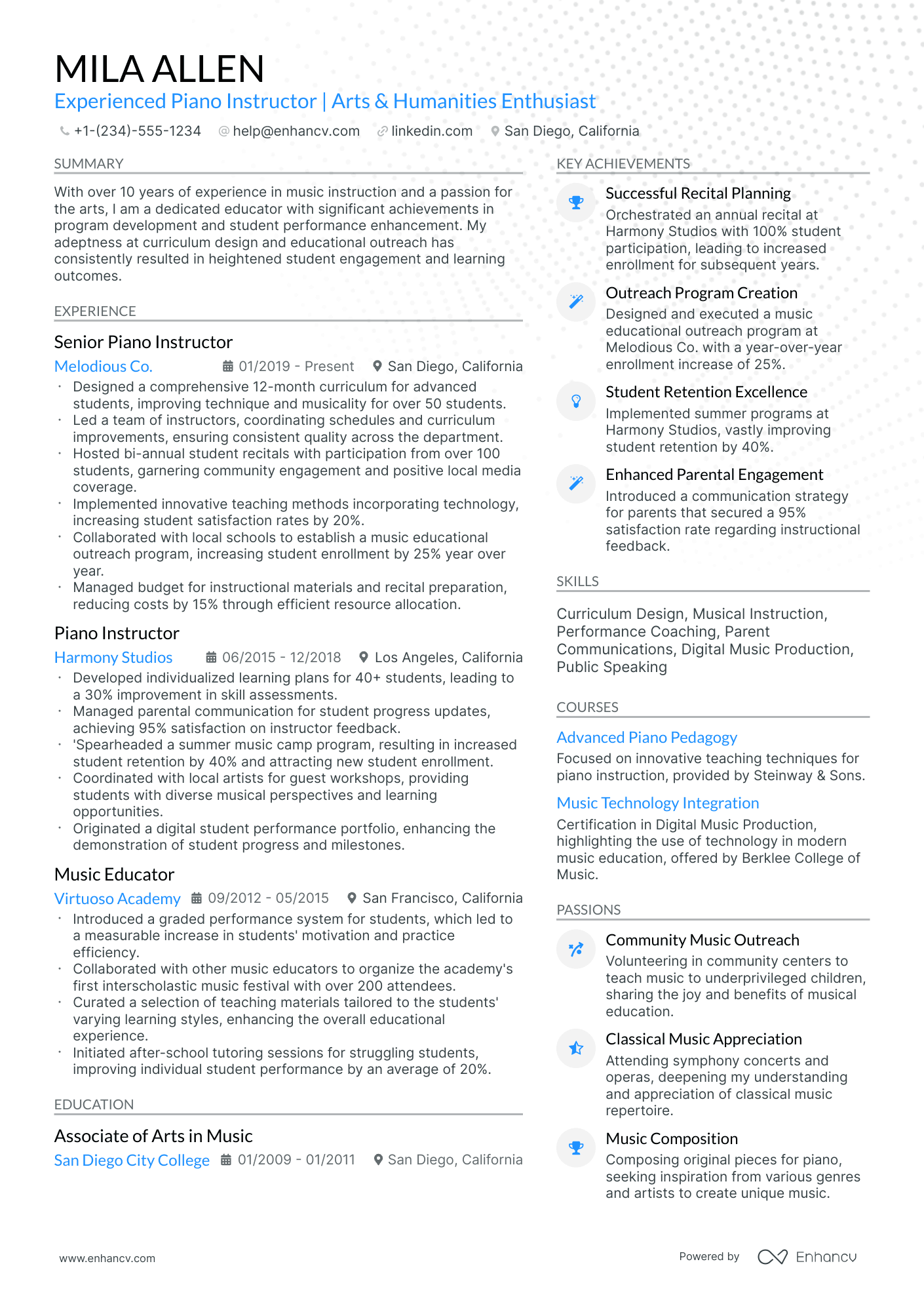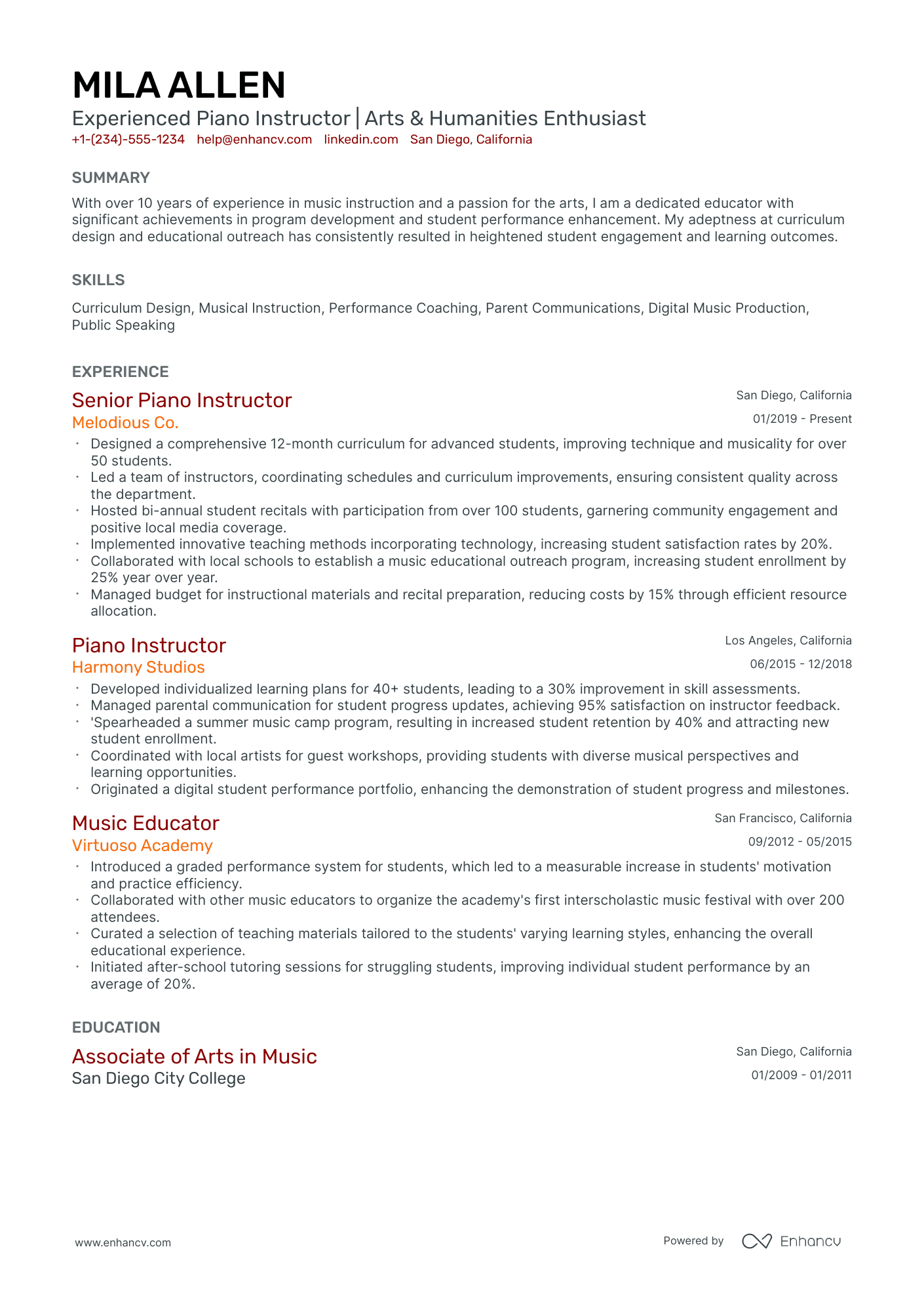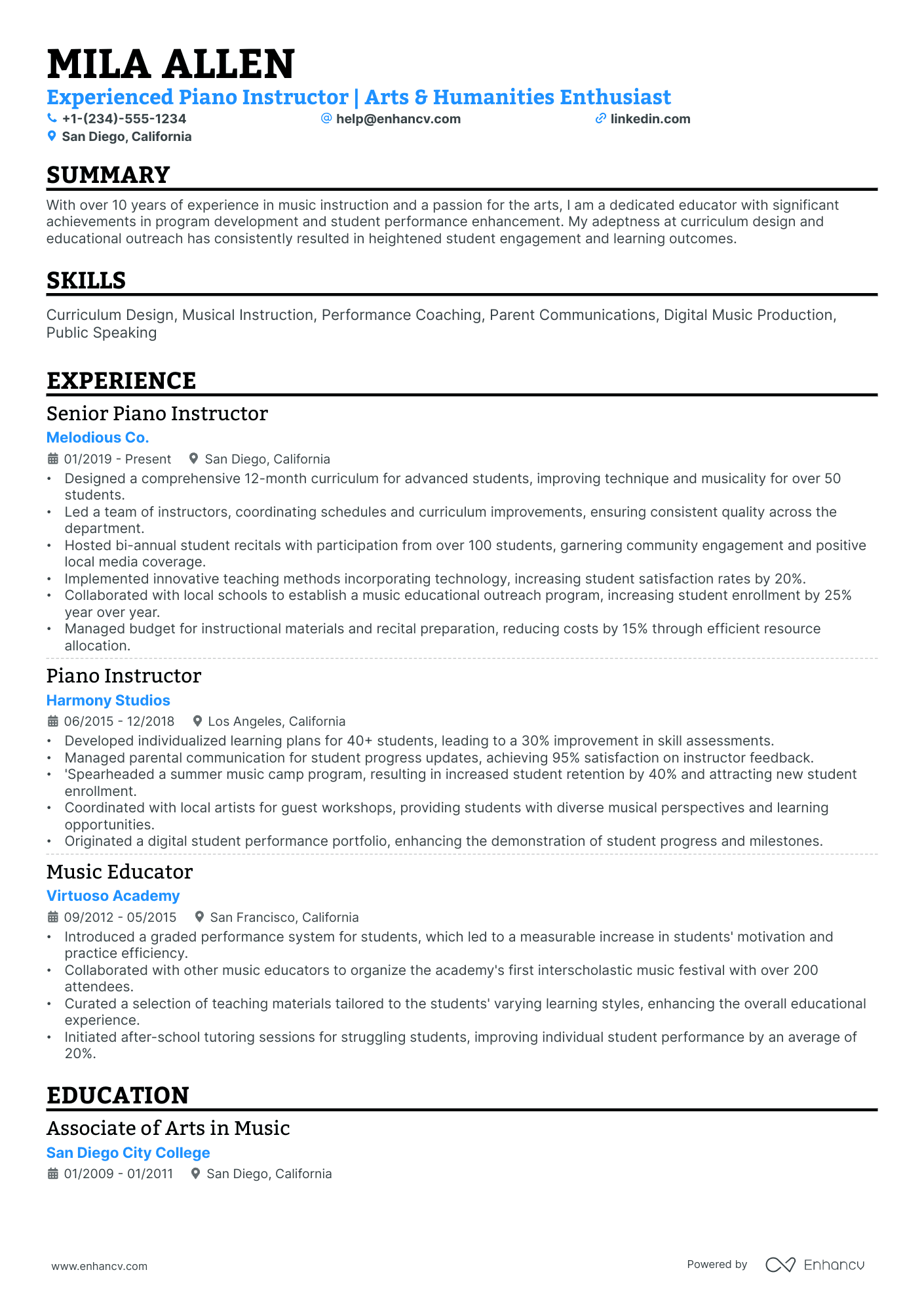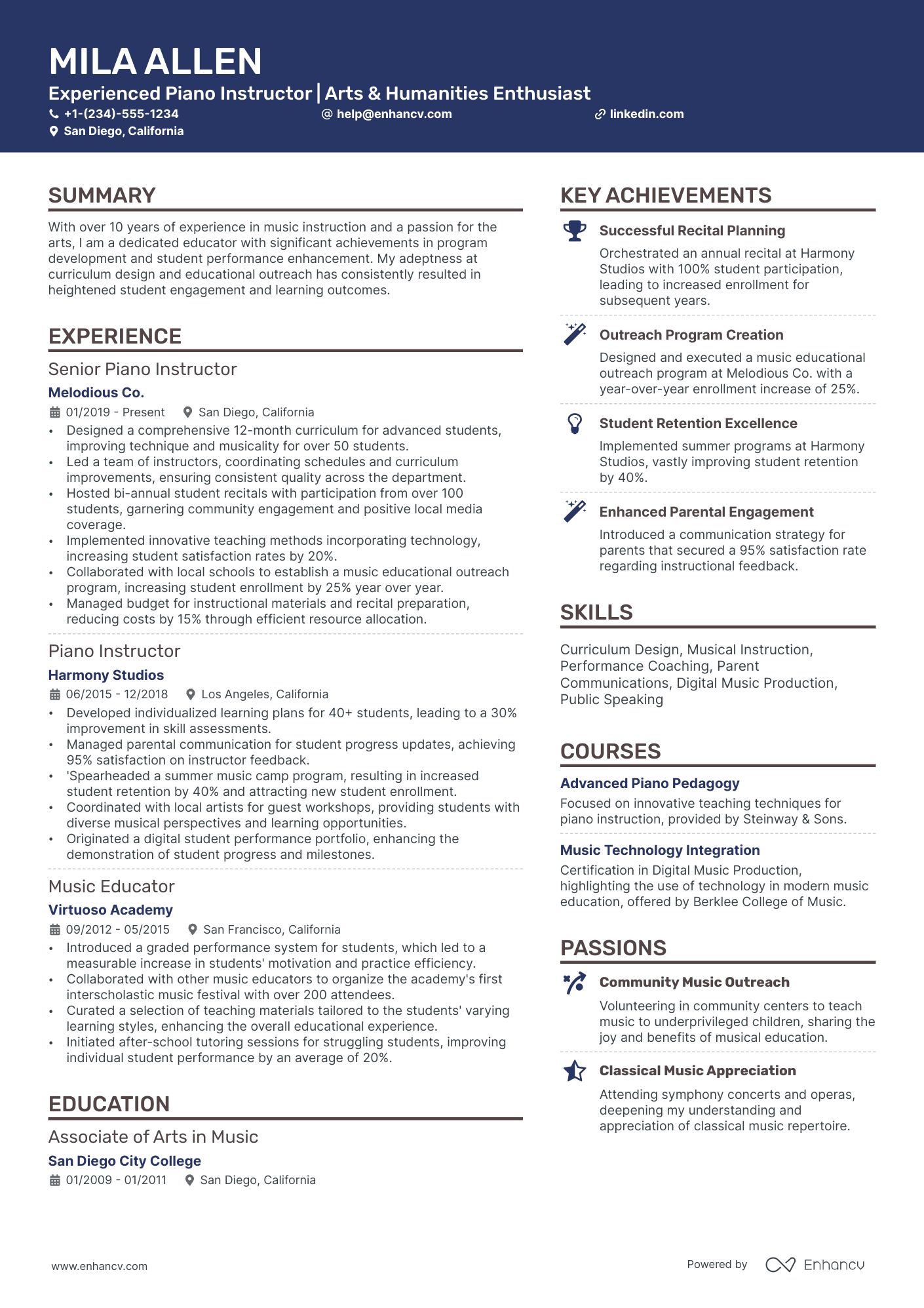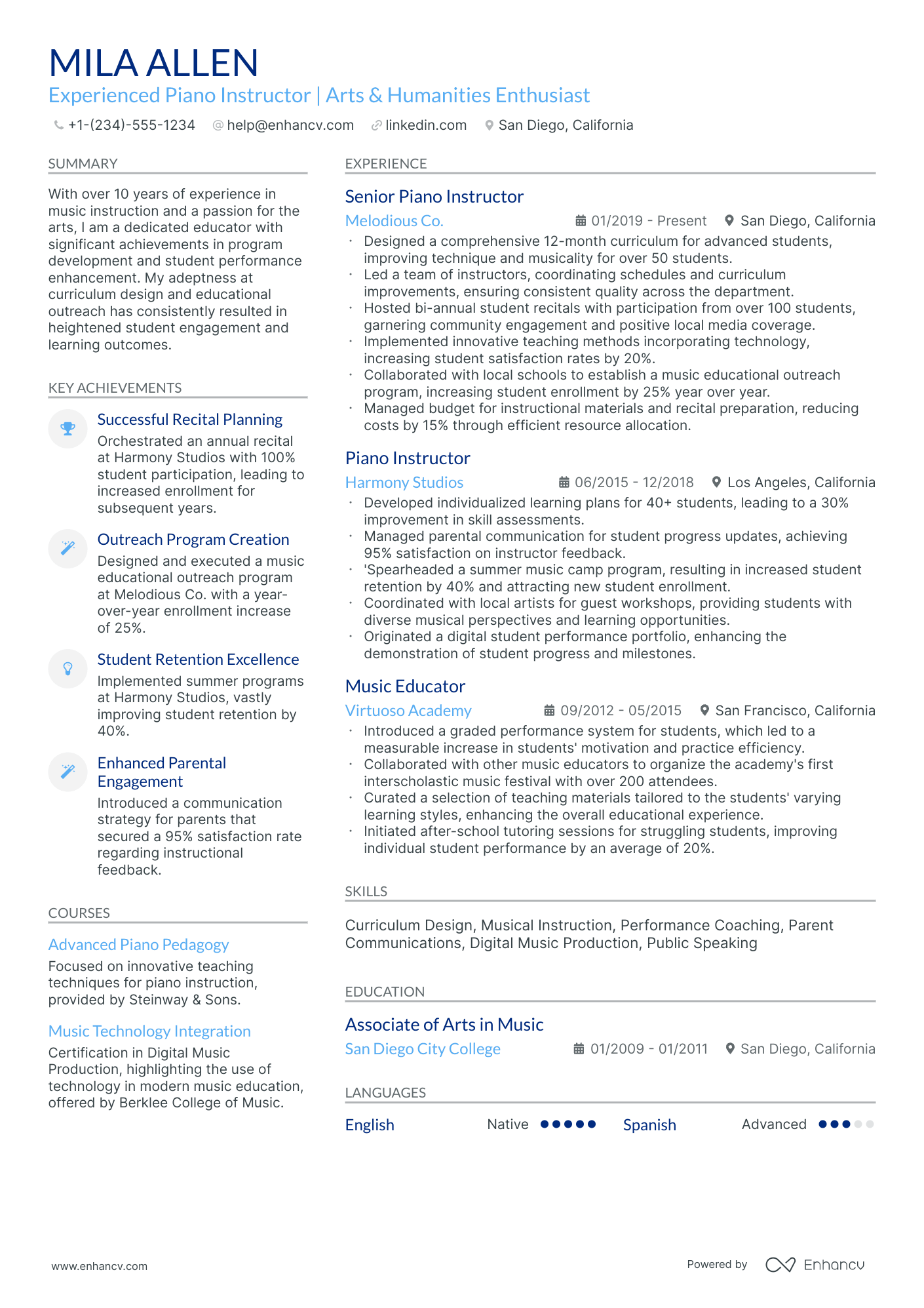As a piano teacher, articulating the breadth of your musical expertise and teaching experience without overwhelming your resume can be quite challenging. Our comprehensive guide will help you concisely capture and present your skills, ensuring your resume hits all the right notes with potential employers.
- Defining the highlights of your piano teacher career through your resume summary, objective, and experience.
- Real-world piano teacher resume samples with best practices on how to stand out amongst the endless pile of candidate resumes.
- Most in-demand piano teacher resume skills and certifications across the industry.
- Standardizing your resume layout, while maintaining your creativity and individuality.
If the piano teacher resume isn't the right one for you, take a look at other related guides we have:
- Math Teacher Resume Example
- Educational Consultant Resume Example
- Correctional Officer Resume Example
- Kindergarten Teacher Resume Example
- Music Teacher Resume Example
- Middle School Teacher Resume Example
- Online Teacher Resume Example
- Summer School Teacher Resume Example
- Toddler Teacher Resume Example
- First Grade Teacher Resume Example
Formatting the layout of your piano teacher resume: design, length, and more
When it comes to the format of your piano teacher resume , you've plenty of opportunities to get creative. But, as a general rule of thumb, there are four simple steps you could integrate into your resume layout.
- If you have plenty of experience, you'd like to showcase, invest in the reverse-chronological resume format . This format focuses on your latest experience items and skills you've learned during your relevant (and recent) jobs.
- Don't go over the two-page limit, when creating your professional piano teacher resume. Curate within it mainly experience and skills that are relevant to the job.
- Make sure your piano teacher resume header includes all of your valid contact information. You could also opt to display your professional portfolio or LinkedIn profile.
- Submit or send out your piano teacher resume as a PDF, so you won't lose its layout and design.
Consider your target market – resumes in Canada, for example, follow different layout conventions.
Upload & Check Your Resume
Drop your resume here or choose a file. PDF & DOCX only. Max 2MB file size.
PRO TIP
Mention specific courses or projects that are pertinent to the job you're applying for.
Essential sections that should make up your piano teacher resume include:
- The header - with your contact details (e.g. email and telephone number), link to your portfolio, and headline
- The summary (or objective) - to spotlight the peaks of your professional career, so far
- The experience section - with up to six bullets per role to detail specific outcomes
- The skills list - to provide a healthy mix between your personal and professional talents
- The education and certification - showing your most relevant degrees and certificates to the piano teacher role
What recruiters want to see on your resume:
- Formal Education in Music or Piano Performance: Degree from a recognized conservatory or university.
- Teaching Experience: Years of experience teaching piano to various age groups and skill levels.
- Performance History: Recitals, concerts, or competitions showcasing piano expertise.
- Knowledge of Pedagogy: Techniques and methodologies unique to piano instruction.
- Repertoire Familiarity: Breadth of knowledge in classical, contemporary, and other piano music genres.
Five dos for building your piano teacher resume experience section
The best strategic approach to your piano teacher resume experience section is to support your particular responsibilities with actions and achievements.
For example, you could list:
- Up to six responsibilities in your day-to-day work, supported by why they're important for your role, department, or organization;
- Experience items that have helped you sustain and enhance your technical knowledge within the field, or, perhaps, have helped you grow as a professional;
- Any metrics that pinpoint your success within your past roles;
- How you've solved specific problems in your day-to-day work;
- Strategies and solutions you've implemented for growth - and how that growth was measured.
The piano teacher resume experience is your best shot at making a good first impression on recruiters. That's why we've included some real-world professional examples to get you thinking about how you present your experience:
- Developed individualized curriculum for over 40 students with diverse learning styles, increasing their musical proficiency and performance skills.
- Organized and directed multiple annual recitals showcasing students' progress, with participation of up to 35 students each event, receiving positive community feedback.
- Implemented a digital record-keeping system for tracking student progress, attendance, and billing, enhancing organizational efficiency by 30%.
- Collaborated with local schools to introduce a music enrichment program, resulting in a 20% increase in student enrollment for beginner piano classes.
- Successfully prepared high school students for state-level competitions, with 85% of participants achieving distinction grades.
- Spearheaded the creation of an adult beginner's workshop series, attracting over 50 participants in its inaugural year.
- Designed an online piano teaching program catering to remote learners, effectively doubling the studio's student capacity.
- Received a teaching excellence award in 2022 for demonstrating outstanding commitment to student success and pedagogical innovation.
- Curated a multicultural piano repertoire to promote global music appreciation, increasing student engagement by 40%.
- Integrated music technology tools into the curriculum, enhancing learning experiences by incorporating synthesizers and music production software.
- Established a performance mentorship program, pairing advanced students with beginners to foster a supportive learning community.
- Negotiated partnerships with local music instrument shops, securing student discounts and sponsorships for school events.
- Managed a piano studio of 25 students, maintaining a 95% student retention rate over four years through personalized teaching methods.
- Facilitated music theory workshops which helped students achieve an average of 15% higher scores on standardized theory exams.
- Organized a collaborative concert series with other local music teachers to broaden performance opportunities and community engagement.
- Served as head of the Piano Department, leading initiatives to modernize the curriculum, resulting in a 25% increase in department enrollment.
- Formulated assessment criteria aligned with national standards, improving student preparedness for higher education in music.
- Instrumental in securing a grant to purchase digital pianos for the school, significantly enhancing the quality of instruction.
- Mentored student teachers in methodology and practice, developing the next generation of qualified piano educators.
- Conducted master classes for intermediate and advanced students, focusing on technique improvement and expressive performance.
- Launched a summer intensive piano camp which grew to enroll over 60 students annually.
- Introduced and managed a successful Suzuki Piano program, tailoring instruction methodologies for students as young as four years old.
- Achieved a 100% success rate for students taking pre-college entrance examinations in piano performance.
- Partnered with local cultural associations to incorporate piano music from various ethnic traditions, enriching students' musical diversity.
- Expanded studio offerings by introducing advanced piano technique workshops attracting students from neighboring cities.
- Pioneered the use of interactive piano learning apps in lessons, leading to greater student retention and practice consistency.
- Organized bi-monthly student performance and critique sessions, enhancing their public performance skills and confidence.
- Optimized lesson plans with multimedia resources, resulting in a 20% increase in student understanding of music theory concepts.
- Coordinated with local orchestras to provide students with accompanist opportunities, facilitating real-world experience for over 30 students.
- Led the development of an annual piano workshop focusing on baroque and classical repertoire, drawing interest from over 100 participants.
The following content includes information from "O*NET OnLine" by the U.S. Department of Labor, Employment and Training Administration (USDOL/ETA). Used under the CC BY 4.0 license. The data represents the top responsibilities present on the task lists for piano teacher professionals.
Top Responsibilities for Piano Teacher:
- Explain and demonstrate artistic techniques.
- Evaluate and grade students' class work, performances, projects, assignments, and papers.
- Prepare students for performances, exams, or assessments.
- Initiate, facilitate, and moderate classroom discussions.
- Prepare and deliver lectures to undergraduate or graduate students on topics such as acting techniques, fundamentals of music, and art history.
- Prepare course materials, such as syllabi, homework assignments, and handouts.
- Maintain student attendance records, grades, and other required records.
- Keep abreast of developments in the field by reading current literature, talking with colleagues, and participating in professional conferences.
- Plan, evaluate, and revise curricula, course content, course materials, and methods of instruction.
- Compile, administer, and grade examinations, or assign this work to others.
Quantifying impact on your resume
- Include the number of years you have been teaching piano, highlighting your experience and dedication.
- List the exact number of students you have taught to demonstrate the scope of your influence.
- Mention the percentage of students who have passed music exams or achieved distinctions to showcase teaching effectiveness.
- Specify the number of recitals, concerts, or competitions your students have participated in to highlight real-world experience.
- Include the range of student ages and skill levels to show versatility in teaching methods.
- Provide the number of masterclasses or workshops you have conducted to exhibit leadership and expertise.
- Note any increase in student enrollment or retention rates under your instruction to prove your ability to maintain student interest.
- Quantify the expansion of piano programs or curriculums you've developed to display initiative and contribution to institutional growth.
Action verbs for your piano teacher resume
What can candidates do about their resume, if they have no experience
Job requirements can sometimes be answered by other elements you could make more prominent in your piano teacher resume.
Thus, you'd be substituting your lack of experience with your relevant:
- Education with details of skills you've obtained that align with the job
- Internships and short-term jobs that are once more dedicated to putting your expertise in the spotlight
- Skills section answering basic and - potentially - more specific job qualifications
- Strengths or accomplishments to show the unique value you present, even as a candidate with less or no professional experience in the industry.
Recommended reads:
PRO TIP
Showcase any ongoing or recent educational efforts to stay updated in your field.
In-demand hard skills and soft skills for your piano teacher resume
A vital element for any piano teacher resume is the presentation of your skill set.
Recruiters always take the time to assess your:
- Technological proficiency or hard skills - which software and technologies can you use and at what level?
- People/personal or soft skills - how apt are you at communicating your ideas across effectively? Are you resilient to change?
The ideal candidate presents the perfect balance of hard skills and soft skills all through the resume, but more particular within a dedicated skills section.
Building your piano teacher skills section, you should:
- List up to six skills that answer the requirements and are unique to your expertise.
- Include a soft skill (or two) that defines you as a person and professional - perhaps looking back on feedback you've received from previous managers, etc.
- Create up to two skills sections that are organized based on the types of skills you list (e.g. "technical skills", "soft skills", "piano teacher skills", etc.).
- If you happen to have technical certifications that are vital to the industry and really impressive, include their names within your skills section.
At times, it really is frustrating to think back on all the skills you possess and discover the best way to communicate them across.
We understand this challenge - that's why we've prepared two lists (of hard skills and soft skills) to help you build your next resume, quicker and more efficiently:
Top skills for your piano teacher resume:
Piano proficiency
Music theory
Sight-reading
Keyboard harmony
Music notation software (e.g., Finale, Sibelius)
Audio recording software (e.g., GarageBand, Pro Tools)
Sheet music arrangement
Digital piano technology
Metronome usage
Teaching materials development
Communication
Patience
Empathy
Adaptability
Motivational skills
Organization
Creativity
Time management
Interpersonal skills
Problem-solving
Next, you will find information on the top technologies for piano teacher professonals from "O*NET OnLine" by the U.S. Department of Labor, Employment and Training Administration (USDOL/ETA). Used under the CC BY 4.0 license.
Top technologies for Piano Teacher’s resume:
- Adobe Creative Cloud software
- Adobe Illustrator
- Blackboard software
- Moodle
- Adobe After Effects
- Apple Final Cut Pro
PRO TIP
List all your relevant higher education degrees within your resume in reverse chronological order (starting with the latest). There are cases when your PhD in a particular field could help you stand apart from other candidates.
Including your education and certification on your piano teacher resume
The significance of your resume education section is paramount. It can show your diverse talents and experiences that are relevnt to the position.
- Incorporate educational qualifications, mentioning the institution and period.
- If you're on your academic journey, pinpoint your expected completion date.
- Opt for leaving out degrees that don't serve the job's purpose.
- Provide an overview of your educational experiences if it spotlights your milestones.
When recruiting for piano teacher roles, candidates with relevant education and certification definitely stand out amongst competitors.
Showcase your academic background in the best way possible by:
- Listing all degrees and certifications that are part of the candidate qualifications in the piano teacher advert
- Including any extra certificates, if they make sense to your application
- Not going over the top in details - the certificate name, institution, and dates are enough
- If you're in the process of obtaining a degree or certificate that's relevant to the job, include your expected graduation/certification dates
The education and certification sections help back up your application with years of experience in the industry or niche.
Select some of the most cutting-edge or applicable credentials for your next piano teacher application from our list:
The top 5 certifications for your piano teacher resume:
- Music Teachers' Association of California Certificate of Merit (MTAC CM) - Music Teachers' Association of California
- Associate Diploma of the Royal Conservatory (ARCT) - The Royal Conservatory of Music
- National Certification for Teachers of Music (NCTM) - Music Teachers National Association
- Diploma of the Associated Board of the Royal Schools of Music (DipABRSM) - ABRSM
- Suzuki Method Teaching Certification - Suzuki Association of the Americas
The content below includes information from "O*NET OnLine" by the U.S. Department of Labor, Employment and Training Administration (USDOL/ETA). Used under the CC BY 4.0 license. The data represents the top associations for piano teacher professionals.
Top US associations for a Piano Teacher professional
- Actors' Equity Association
- American Association of University Professors
- American Federation of Musicians
- American Musicological Society
- American Society for Theatre Research
PRO TIP
List all your relevant higher education degrees within your resume in reverse chronological order (starting with the latest). There are cases when your PhD in a particular field could help you stand apart from other candidates.
Recommended reads:
The ideal piano teacher candidate resume summary or objective
You may have heard that your resume top one-third plays an important part in your application.
It basically needs to show strong alignment with the job advert, your unique skill set, and your expertise.
Both the resume summary and resume objective could be used to ensure you've shown why you're the best candidate for the role.
Use the:
- Resume objective to pinpoint your current successes, that are applicable to the field, and your vision for your career. Remember to state how you see yourself growing within this new career opportunity.
- Resume summary as an instrument to pinpoint what is most applicable and noteworthy form your professional profile. Keep your summary to be no more than five sentences long.
At the end of the day, the resume summary or objective is your golden opportunity to shine a light on your personality as a professional and the unique value of what it's like to work with you.
Get inspired with these piano teacher resume examples:
Resume summaries for a piano teacher job
- Seasoned piano instructor with over 15 years of experience, adept in classical and contemporary music, seeking to nurture the next generation of pianists. Successfully prepared students for prestigious competitions, with a record of multiple first-place wins, highlighting my commitment to excellence in music education and student development.
- Dynamic music educator with a Master's degree in Music Education and 10 years of experience teaching piano to students of all ages. Specialized in creating engaging, personalized lesson plans to foster musical growth, resulted in consistently high student recital performances and increased lesson retention rates by 40% in the past year.
- Highly motivated former professional ballet dancer, eager to transfer a decade of experience in performing arts to teaching piano. Proven discipline and artistry nourished through years on stage, combined with a fresh perspective and a deep passion for bringing the joy of music to budding musicians.
- Accomplished software engineer with a lifelong passion for piano, seeking to pivot careers and bring analytical skills to a musical setting. Self-taught pianist for over 20 years, with a unique approach to problem-solving that fosters creativity and persistence in mastering challenging compositions.
- Eager to launch a career in piano education, I am driven by a passion for both music and teaching. Committed to learning innovative pedagogic strategies and continuously improving technical abilities in order to provide students with a solid foundation in piano performance and theory.
- Recent music graduate with a focus on piano performance, aspiring to cultivate a nurturing environment for aspiring pianists. Dedicated to developing a modern and engaging curriculum that incorporates various musical styles and techniques, ensuring a comprehensive and diverse musical education for students.
Optimize your resume summary and objective for ATS
Drop your resume here or choose a file.
PDF & DOCX only. Max 2MB file size.
Average salary info by state in the US for piano teacher professionals
Local salary info for Piano Teacher.” Source: My Next Move, National Center for O*NET Development. Accessed 10/15/2024
| State | Average Salary (in USD) |
|---|---|
| US National Average | $80,360 |
| California (CA) | $107,680 |
| Texas (TX) | $77,000 |
| Florida (FL) | $66,420 |
| New York (NY) | $108,020 |
| Pennsylvania (PA) | $97,480 |
| Illinois (IL) | $77,260 |
| Ohio (OH) | $74,040 |
| Georgia (GA) | $78,150 |
| North Carolina (NC) | $65,910 |
| Michigan (MI) | $69,270 |
Other piano teacher resume sections to support your expertise and skills
Recruiters are always on the lookout for that piano teacher candidate who brings about even more value to the role.
This can be either via their personality or additional accreditations they have across the industry.
Add to your resume any of the four sections that fit your profile:
- Projects for your most impressive, cutting-edge work;
- Awards or recognitions that matter the most;
- Publications further building up your professional portfolio and accreditations;
- Hobbies and interests to feature the literature you read, how you spend your time outside of work, and other personality traits you deem may help you stand out .
Key takeaways
- All aspects of your resume should be selected to support your bid for being the perfect candidate for the role;
- Be intentional about listing your skill set to be balanced with both technical and people capabilities, while aligning with the job;
- Include any experience items that are relevant to the role and ensure you feature the outcomes of your responsibilities;
- Use the summary or objective as a screenshot of your best experience highlights;
- Curate various resume sections to showcase personal, transferable skills.
